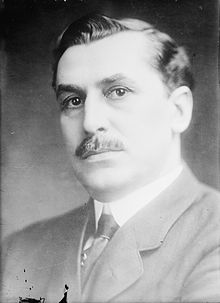Edwin T. Meredith
| Edwin T. Meredith | |
|---|---|
 |
|
| 6th United States Secretary of Agriculture | |
|
In office February 2, 1920 – March 4, 1921 |
|
| President | Woodrow Wilson |
| Preceded by | David F. Houston |
| Succeeded by | Henry C. Wallace |
| Personal details | |
| Born |
Edwin Thomas Meredith December 23, 1876 Avoca, Iowa, United States |
| Died | June 17, 1928 (aged 51) Des Moines, Iowa, United States |
| Resting place | Glendale's Masonic Cemetery, Des Moines, Iowa, United States |
| Political party | Democratic |
| Spouse(s) | Edna Elliott Meredith (1877 - 1961) |
| Children | Edwin Thomas Meredith, Jr. Mildred Marie Meredith |
| Alma mater | Des Moines College |
| Profession | Government |
Edwin Thomas Meredith (December 23, 1876 – June 17, 1928) was founder of the Meredith Corporation and was the U.S. Secretary of Agriculture in President Woodrow Wilson's administration.
Meredith was born in Avoca, Iowa on December 23, 1876, to Minerva Jane (née Marsh) and Thomas Oliver Meredith. he attended Highland Park College in Des Moines. In 1894, Meredith became the general manager of Farmer's Tribune, a Populist newspaper run by his grandfather.
Meredith married Edna C. Elliott on January 8, 1896. They resided in Des Moines and were the parents of two children, Edwin T. "Ed" Meredith II, and Mildred M. Bohen.
Meredith ran the Farmer's Tribune until 1902, when he began publishing his own magazine, Successful Farming, which reached 100,000 subscribers by 1908.
Meredith served as Vice President and President of the Agricultural Publishers Association and was a member of the Board of Directors of the United States Chamber of Commerce from 1915 until 1919, and again from 1923 until his death.
Once a member of the Populist Party, he was later active as a Democrat, and ran unsuccessfully for a U.S. Senate seat in 1914. In 1916, he ran unsuccessfully for Governor.
Despite his unsuccessful campaigns, Meredith maintained a high profile among rural voters and farmers because of his magazine. As a result, Woodrow Wilson appointed him to the Treasury Department's Advisory Committee on Excess Profits, and he served on the Board of Directors of the Federal Reserve Bank of Chicago from 1918 until 1920.
...
Wikipedia
